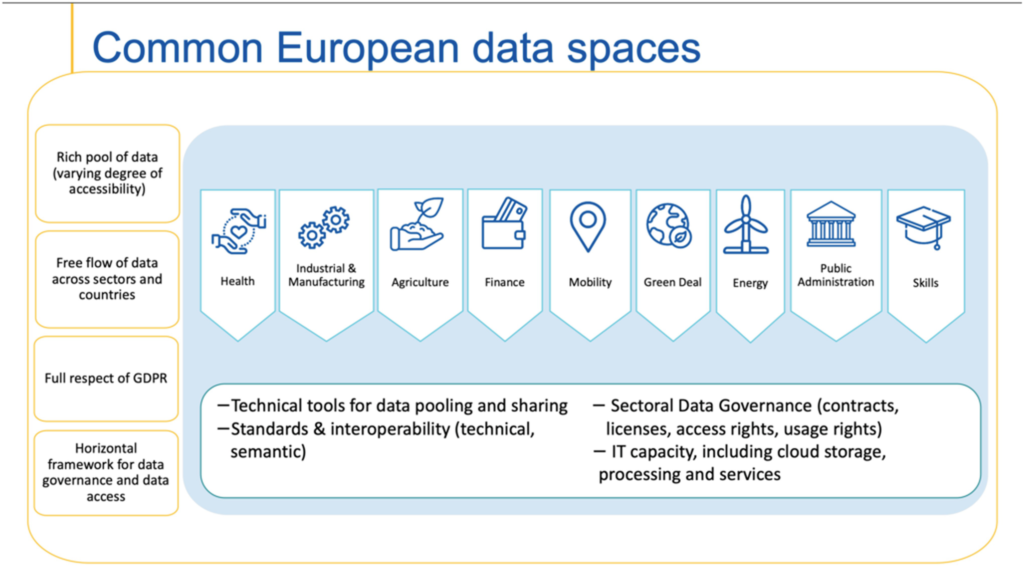For European data economy to develop further and meet expectations, large volumes of cross-sectoral, unbiased, high-quality and trustworthy data need to be made available. The exploration of ethical, secure and trustworthy legal, regulatory and governance frameworks is needed. European values, e.g. democracy, privacy safeguards and equal opportunities, can become the trademark of European data economy technologies, products and practices. Rather than be seen as restrictive, these values enforced by legislation should be considered as a unique competitive advantage in the global data marketplace.
To reflect this new reality, the European data strategy was revised in 2020 to set out a vision for the EU to become a role model for a data-driven society and to create a single market for data to ensure Europe’s global competitiveness and data sovereignty. As highlighted by EU Commissioner Thierry Breton: “To be ahead of the curve, we need to develop suitable European infrastructures allowing the storage, the use, and the creation of data-based applications or Artificial Intelligence services. I consider this as a major issue of Europe’s digital sovereignty”.
Alignment and integration of established data-sharing technologies and solutions, and further developments in architectures and governance models aiming to unlock data silos, would enable data analytics across a European data-sharing ecosystem. This will enable AI-enhanced digital services to make analysis and predictions on European-wide data, thereby combining data and service economies. New business models will help to exploit the value of those data assets through the implementation of AI among participating stakeholders including industry; local, national and European authorities and institutions; research entities; and even private individuals.
As part of the revised data strategy, common European data spaces will ensure that more data becomes available for use in the economy and society while keeping companies and individuals who generate the data in control (Communication: A European strategy for data 2020). Platform approaches have proved successful in many areas of technology (Gawer and Cusumano 2014), from supporting transactions among buyers and sellers in marketplaces (e.g. Amazon), innovation platforms that provide a foundation on which to develop complementary products or services (e.g. Windows), to integrated platforms which are a combined transaction and innovation platform (e.g. Android and the Play Store). The idea of large-scale “data” platforms has been touted as a possible next step to support data ecosystems (Curry and Sheth 2018). An ecosystem data platform would have to support continuous, coordinated data flows, seamlessly moving data among systems (Curry and Ojo 2020). Data spaces, platforms and marketplaces are enablers, the key to unleashing the potential of such data. Significant technical challenges such as interoperability, data verification and provenance support, quality and accuracy, decentralised data sharing and processing architectures, and maturity and uptake of privacy-preserving technologies for big data have a direct impact on the data made available for sharing.The nine initial common European data spaces (Fig. 1) will be the following:
- An industrial data space, to support the competitiveness and performance of the EU’s industry
- A Green Deal data space, to use the major potential of data in support of the Green Deal priority actions on issues such as climate change, circular economy, pollution, biodiversity and deforestation
- A mobility data space, to position Europe at the forefront of the development of an intelligent transport system
- A health data space, essential for advances in preventing, detecting and treating diseases as well as for informed, evidence-based decisions to improve the healthcare systems
- A financial data space, to stimulate innovation, market transparency, sustainable finance as well as access to finance for European businesses and a more integrated market
- An energy data space, to promote a more substantial availability and cross-sector sharing of data, in a customer-centric, secure and trustworthy manner
- An agriculture data space, to enhance the sustainability performance and competitiveness of the agricultural sector through the processing and analysis of data
- Data spaces for public administrations, to improve transparency, accountability and efficiency of public spending, fighting corruption, both at EU and national levels
- A skills data space, to reduce the skills mismatches between the education and training systems and the labour market needs

Excerpt from: Zillner S. et al. (2021) Data Economy 2.0: From Big Data Value to AI Value and a European Data Space. In: Curry E., Metzger A., Zillner S., Pazzaglia JC., García Robles A. (eds) The Elements of Big Data Value. Springer, Cham. https://doi.org/10.1007/978-3-030-68176-0_16
References:
- Communication: A European strategy for data. (2020). Retrieved from https://ec.europa.eu/info/sites/info/files/communication-european-strategy-data-19feb2020_en.pdf
- Gawer, A., & Cusumano, M. A. (2014). Industry platforms and ecosystem innovation. Journal of Product Innovation Management, 31(3), 417–433. https://doi.org/10.1111/jpim.12105
- Curry, E., & Sheth, A. (2018). Next-generation smart environments: From system of systems to data ecosystems. IEEE Intelligent Systems, 33(3), 69–76. https://doi.org/10.1109/MIS.2018.033001418
- Curry, E., & Ojo, A. (2020). Enabling knowledge flows in an intelligent systems data ecosystem. In Real-time Linked Dataspaces (pp. 15–43). Berlin: Springer. https://doi.org/10.1007/978-3-030-29665-0_2